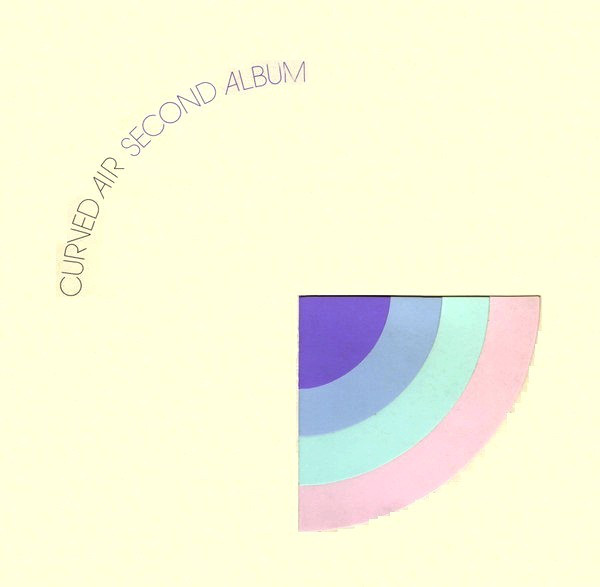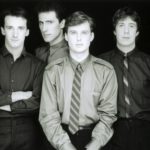A latecomer to live shows, my first one apart from local bands playing in a scout hut was a double header featuring Wishbone Ash and Curved Air in a philharmonic hall in Hamburg of all places. Everyone was seated. Curved Air took to the stage first. The show is lost in the mists of time now but I do recall I couldn’t take my eyes off Sonja Kristina, not long out of the seminal ‘tribal love-rock’ musical Hair, one of the first females to front a British rock band and who topped British Female Vocalist polls right through the 1970s. I’m sure I wasn’t the only one.
Having been in absentia for three decades and then regrouping in 2008, they’re still going strong today, albeit with a much-changed line-up, the original members Darryl Way, Francis Monkman, Rob Martin, his replacement Ian Eyre and Florian Pilkington-Miksa having dropped out forever at some stage between 1971 and 2017 when Pilkington-Miksa hung up his sticks for the last time. At one stage in the 1970s he was replaced by Stewart Copeland, who later married Sonja Kristina.
Pilkington-Miksa was still there when I last saw them, almost three years ago, one of only two originals, with Kristina, to have survived into the second decade of the 21st century, and they put on a flawless performance. As I write they are still touring and fundamentally the band is still the same as in 2015, featuring a Keith Emerson-lookalike keyboardist – Robert Norton – and in Paul Sax a violinist who has filled the massive shoes of Darryl Way. Curved Air was one of the first bands to introduce violin into a rock repertoire.
Big city philharmonic halls don’t figure now. You can see them at the Rope Tackle Arts Centre in Shoreham by Sea though, and The Waterfront Studios in Norwich, where you’ll no doubt rub shoulders with Alan Partridge.
But this isn’t about live shows right now. What Curved Air have done is to release, via Cherry Red Records and the Esoteric Recordings label that specialises in progressive, psychedelic and classical rock, a two-disc CD, the first half of which is a digitally re-mastered (by Monkman) version of their 1971 ‘Second Album’ (it’s actual title), along with five bonus tracks, four of them previously unreleased, and a 1971 live John Peel Sunday Concert from the same year.
The second disc has a TV promotional film, a “Warner Brothers Present Curved Air” film (Curved Air was the first British band ever signed to Warner Brothers) and contributions from Pop Deux, a French television channel and Radio Bremen’s Beat Club, all from the same year, 1971.
What is immediately noticeable about the second disc is that it contains three versions each of ‘Vivaldi’ (from first album ‘Air Conditioning’) and ‘Back Street Luv’, arguably, together with Back Street Luv’s single B-side, ‘Everdance’, Curved Air’s most famous songs. They are the ones most people would come up with as Curved Air songs if they were ever a category on ‘Pointless.’
Back Street Luv reached number four in the UK charts and was the band’s only charting single. Contrary to common misconceptions it isn’t about prostitution but about the 15-year old Kristina’s (or Sonja Christina Shaw as she then was) illicit affair as she skipped school to hang out with a seedy character at Brentwood’s snooker hall, whom she believed to be a ‘rock star’ and whom she fell in love with and seduced. It turned out he’d been in prison and had a wife and child. While she persevered with him and his friends she could never take him home as her father ran a borstal, and the guy had once been an inmate there, so he would know who he was.
(Video: ‘Backstreet Luv’, Radio Bremen TV 1971 [as featured on Disc 2]. Florian Pilkington-Miksa had contracted Hepatitis B and was replaced for a while by session drummer Barry de Souza)
Curved Air came to prominence in the early 1970s as a progressive rock band along with their peers such as King Crimson, Yes, ELP, Genesis, Jethro Tull, Gentle Giant and the rest, with all the bells and whistles that went with the genre such as complex arrangements, long and flamboyant instrumental pieces, rapid note-playing on all instruments, interesting time signatures and the industrial use of an as-yet fairly new piece of equipment, the electronic synthesiser.
In common with most of those peers Curved Air had, paradoxically, several original features that set them apart.
One of the most striking was the frequent use of the violin as the lead instrument as perfected by Darryl Way and as evidenced below in the ‘Vivaldi’ Video and on his violin solo in ‘Everdance’. Apart from the band being an early adapter of the violin, Way, a graduate of the Royal College of Music where he specialised in the instrument, was one of the first to connect it to electrical amplification. Some American guy was famously maligned as ‘Judas’ for doing the same to a guitar only a handful of years beforehand.
The power that Way brought to the violin, wielding it like a guitar, can be experienced here on this 14-minute version of Vivaldi.
Elsewhere on Disc 2 the ostentation of the behatted Monkman is evident as he brandishes his see-through guitar the wrong way around, like a metal detector, and launches into an “anything Emerson and Wakeman can do, I can do better” keyboard demonstration on ‘Propositions’ (from ‘Air Conditioning’).
But it was also slow violin ballads like ‘It Happened Today’, that proved Curved Air’s uniqueness. This track, from ‘Air Conditioning’ but included here as a bonus track, is quite different from much of the prog material that was highly fashionable at the time.
Meanwhile, Kristina’s ethereal vocals (she was, too, one of the earliest advocates of the style) shine through on tracks such as ‘Young Mother’ and especially so on the live BBC recording introduced by someone who sounds like Alan ‘Fluff’ Freeman which is performed as ‘Young Mother in Style’ as it was originally titled by the pre-Curved Air band Sisyphus before Kristina wrote additional lyrics. Amusingly, that introduction is of “the first ever performance anywhere of (this song) by the current rave sensation, Curved Air”. Priceless.
And grand orchestral arrangements that belong in musicals are the order of the day in ‘Jumbo.’
‘Second Album’ was recorded when most of the songs were recently written and touring commitments prevented the band from developing them properly. They had moved on from ‘Air Conditioning’ into the vanguard of British prog rock. Kristina, while professing her fondness for the album admits in the sleeve notes that she wishes they had not rushed it in the studio; “If only we’d been able to spend more time on working through the songs then I feel the album would have been even better”.
Critics at the time weren’t so positive. One described the album as lacking the originality and innovation of previous work, while admitting that ‘Back Street Luv’ was “simply one of the band’s own finest moments….also one of the crucial singles of the early 1970s”.
Something that occurred to me while listening to the album is the similarity between some of the songs and those of Trembling Bells, one of few British bands perpetuating this style today and getting radio airplay, although they are more guitar-based. The most noticeable parallel is that between two individuals; the keyboard-playing singer Kristina and Trembling Bells’ Lavinia Blackwall, who does the same job.
There is an argument that the content and arrangement of the material reflected a division in the band which would lead to their break-up the following year. All the songs on side A were composed by Darryl Way with assistance from Ian Eyre and lyrics by Kristina, while those on side B were composed by Francis Monkman. Monkman explained that he and Way respected each others’ work, but didn’t really see eye-to-eye on most things and never really got the co-writing thing together. He even anticipated a split forming, and it did.
The entire release is something of a hotchpotch. While all the ‘Second Album’ songs are there, others have been introduced from other albums, together with unreleased material and a surfeit of videos, some of them of the same songs repeated. It all gets a bit confusing at first.
Nevertheless, as a chronicle of a band that represents its era magnificently and which is nearing the end of its active life now (Sonja Kristina is 69) – as is prog here in the UK, though it carries on proudly in some countries – it is most definitely one for the album collection to hand to the grandkids as a worthy example of what music used to be.
The Expanded and remastered edition of Second Album is out now on Cherry Red.




